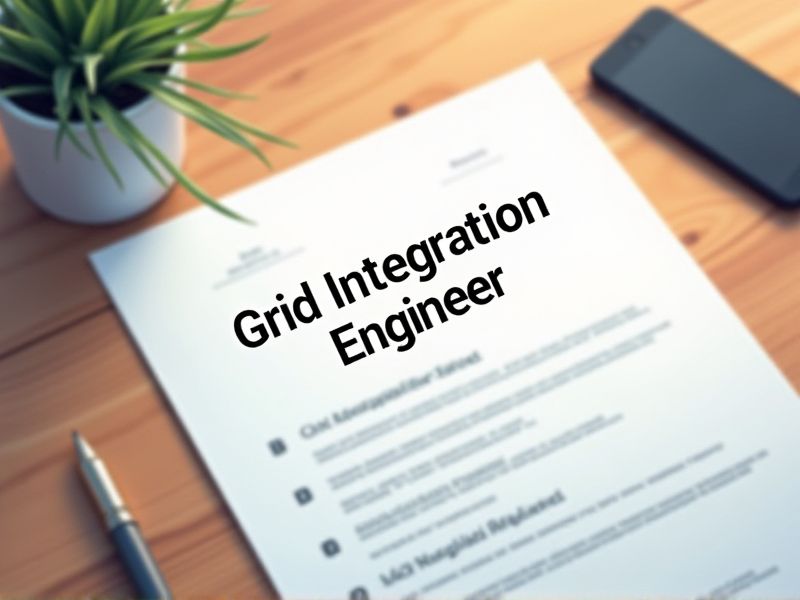
Grid Integration Engineers play a crucial role in ensuring stable and efficient power distribution within the energy grid. Certifications validate their expertise in navigating complex electrical systems and integrating various energy sources. These credentials often elevate the engineer's understanding of current regulations, safety standards, and emerging technologies. Essential certifications for Grid Integration Engineers include industry-recognized credentials that ensure competency and proficiency.
Professional Engineer (PE) - Electrical Engineering
A Professional Engineer (PE) in Electrical Engineering holds the authority and expertise to ensure that grid integration meets all regulatory compliance and safety standards. Their in-depth understanding of electrical systems and grid dynamics enhances the reliability and efficiency of renewable energy sources integration. A PE's certification guarantees that they have met rigorous education and experiential benchmarks, instilling confidence in stakeholders about project viability. Their role is crucial in mitigating risks associated with complex electrical infrastructure and fostering innovation in energy distribution solutions.
NERC Critical Infrastructure Protection (CIP) Certification
NERC Critical Infrastructure Protection (CIP) Certification ensures that Grid Integration Engineers fully understand and comply with the stringent security standards necessary to protect the bulk electric system from cyber threats. Without this certification, an engineer may lack the essential knowledge to implement and maintain robust security protocols that safeguard critical infrastructure. Certification also demonstrates an engineer's commitment to continuous learning and adherence to industry best practices, which is crucial in a rapidly evolving technological landscape. As regulatory demands intensify, certified engineers are better equipped to navigate compliance requirements, reducing the risk of security breaches that can lead to widespread power outages.
Certified Energy Manager (CEM)
Grid Integration Engineers face the increasingly complex tasks of managing diverse energy sources within power grids, where a Certified Energy Manager's expertise ensures efficient energy use and integration. As renewable energy adoption grows, grid systems require optimization to handle variability, a skill set emphasized in CEM certification. Regulatory and sustainability goals drive the need for energy efficiency, where a CEM's understanding can guide compliance and enhance grid performance. Technical and analytical skills honed through CEM certification help engineers address challenges related to grid reliability and distributed energy resource management.
Smart Grid Professional Certification (SGPC)
The increasing complexity of modern smart grids requires Grid Integration Engineers to possess specialized knowledge that a Smart Grid Professional Certification (SGPC) provides. This certification ensures that engineers are familiar with the latest technologies and standards, which enhances grid reliability and efficiency. As renewable energy sources become more prevalent, SGPC equips engineers with the skills necessary to integrate these resources effectively into the grid. Employers find SGPC valuable as it validates an engineer's expertise, reducing risk in project implementation and operation.
Project Management Professional (PMP)
The PMP certification provides a Grid Integration Engineer with essential project management skills, enabling efficient coordination of complex energy projects. This credential ensures standardized processes are followed, reducing errors and enhancing project timelines. Mastery of PMP principles supports effective resource management, crucial for integrating diverse energy sources within the grid. As grid projects gain complexity, PMP-certified engineers can better manage stakeholder expectations and align project outputs with strategic energy goals.
Certified SCADA Security Architect (CSSA)
Grid integration engineers manage the critical task of integrating renewable energy systems with the power grid, often relying on SCADA systems for real-time monitoring and control. SCADA systems are frequent targets of cyber attacks, jeopardizing grid stability and energy distribution. A Certified SCADA Security Architect (CSSA) brings specialized knowledge in protecting these systems from such vulnerabilities. With a CSSA, grid integration engineers can ensure the security of infrastructure, reducing risks of data breaches and operational disruptions.
Renewable Energy Professional (REP)
The transition to renewable energy sources increases the complexity of power systems, necessitating the expertise of a Renewable Energy Professional (REP) for effective grid integration. Their specialized knowledge facilitates the seamless incorporation of variable renewable energy into the grid, stabilizing power supply. REP's proficiency in sustainable technologies ensures compliance with regulatory standards and grid codes. Effective grid integration enhances energy efficiency and reliability, contributing to energy security and sustainability.
Microgrid Design and Operation Certification
Microgrid Design and Operation Certification equips grid integration engineers with specialized knowledge to integrate microgrids effectively, enhancing their adaptability to modern energy systems. As grids evolve to incorporate more renewable energy sources, engineers with this certification are better prepared to manage the complexities involved. Certification ensures engineers understand the intricacies of microgrid operation, including energy storage, distribution, and technology interoperability. Employers can rely on certified professionals to implement solutions that enhance grid reliability and resilience.
ISO 55000 Asset Management Certification
Grid Integration Engineers benefit from ISO 55000 Asset Management Certification as it establishes a framework for efficient and effective management of infrastructure. The certification ensures consistent operation and maintenance, which enhances the reliability and longevity of grid assets. It provides a structured approach to risk management and financial decision-making, directly impacting project success and sustainability. By aligning asset management practices with international standards, engineers ensure compliance and optimize the integration of renewable energy sources into the grid.
International Council on Systems Engineering (INCOSE) Certified Systems Engineering Professional (CSEP)
The growing complexity of energy systems necessitates a comprehensive understanding of systems engineering principles, which the CSEP certification affirms. A Grid Integration Engineer must manage diverse project components, and CSEP certification ensures they possess the required skills. The certification enhances credibility and demonstrates a commitment to maintaining industry standards. As grid technologies evolve, CSEP certification aids engineers in using a systematic approach to integrate emerging solutions effectively.
Summary
When you obtain certifications as a Grid Integration Engineer, you enhance your expertise and credibility in the energy sector. Certified engineers tend to receive better job opportunities and may command higher salaries due to their specialized skills. As a certified professional, you can more effectively implement advanced grid solutions and innovations. This increased competency often leads to improved system efficiency and reliability, benefiting both employers and consumers.
